#marquess of halifax
Text
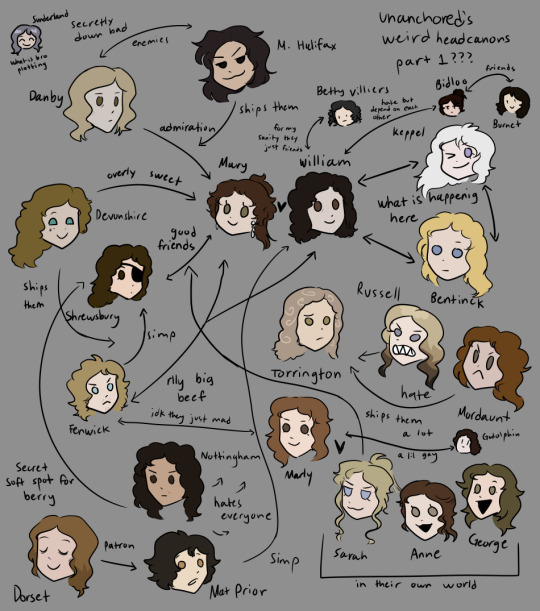
so this is William's time with my stoopid headcanons
might have to zoom in to read stuff
heres a color coded version if the arrows are too confusing lol

hang on just to be sure the dark teal arrow from Fenwick is directed at Marly not Prior's arrow okay thanks
but then again it could also work since Fentwink doesnt like William
#we all agree that keppel has albinism#jkjkjk (but the way we draw him with the white grandma hair)#nahh hes just quirky and unique :P#i rlly like devonshires colors#had to squeeze godolphin and sunderland in cuz i almost forgot them#this can sorta act as a ref for my designs but its only the head soooooo#tagging everyone here we go#william iii#mary ii#marquess of halifax#duke of leeds#sir john fenwick#duke of shrewsbury#arnold joost van keppel#hans willem bentinck#duke of devonshire#elizabeth villers#govert bidloo#gilbert burnet#viscount torrington#edward russell#lord mordaunt#earl of dorset#matthew prior#earl of nottingham#duke of marlborough#sarah churchill#anne stuart#george of denmark#earl of sunderland
11 notes
·
View notes
Note
Hello, sorry to bother, can you recommend historicals where the hero or heroine play an instrument? Or even don't play but like music
Always Be My Duchess by Amalie Howard: Montcroix a cellist and there's an EXCELLENT scene where he's hard after watching Nève dance and he's trying to play his cello to exercise his frustrations but then she shows up and he proceeds to play her like a cello, vibrato and all.
Theory of Earls by Kathleen Ayers: Maggie plays the piano so stirringly that apparently it borders on wanton for her Victorian audience. The hero Tony is also a gifted pianist and this book features piano fingering, piano oral, and a ruination... on a piano.
Nine Rules to Break When Romancing A Rake by Sarah MacLean: Ralston is secretly a great pianist and he's playing very angstily when Callie sneaks into his house to request that he give her her first kiss.
Patience by Lisa Valdez: Both Matthew and Patience are cellists, I think they duet at some point, and there's a this super hot scene where she's in his lap with her legs spread and they're both playing his cello which leads to more.
Marrying Winterborne by Lisa Kleypas: Helen is an accomplished pianist and plays for Rhys in the prior book while he's recovering from his injuries and he's *entranced*. In Marrying Winterborne, Rhys also tries to bribe her into sleeping with him by offering to buy her a new piano. It does work. Kind of.
An Island Princess Starts A Scandal by Adriana Herrera: I mean, they must enjoy the opera enough for Cora to go down on Manuela in their private box during a performance.
In Which Winnie Halifax is Utterly Ruined by Alexandra Vasti: Ditto for Spencer and Winnie ^^
And if you wanna read about endearingly shitty musicians, there's always the Smythe-Smith Quartet series by Julia Quinn.
EDIT:
M is for Marquess by Grace Callaway: Thea and Tremont first meet after she plays the piano and he's super stirred by it and he later admits he wanted to take her on said piano.
#amalie howard#sarah maclean#kathleen ayers#lisa valdez#lisa kleypas#adriana herrera#alexandra vasti#julia quinn#book recs#historical romance#romance novels#ask
10 notes
·
View notes
Note
Just rewatched the 1995 Sense and Sensibility and any recs for romance novels with the Marianne/Brandon vibe?
That movie is so visually gorgeous, it's a great time.
After Dark with the Duke by Julie Anne Long always gives me this vibe. The heroine is much more scandalous (she's an opera singer) but in a lot of ways she's kind of sweet and naive. The hero is 42 to her 25, and he's a decorated veteran, which adds to the vibe. It has that kind of like "decent man initially seems cold and stodgy but he actually isn't" vibe.
You don't get the age gap from this, but In Which Margo Halifax Earns Her Scandalous Reputation by Alexandra Vasti gives me this vibe because you have a sensible, quiet hero who's longed from the flighty, seemingly-silly heroine from afar for a long time and of course comes in clutch when she's in a pinch.
The Wrong Marquess by Vivienne Lorret is another one where it's like... he isn't a lot older than her, but he is the "uptight one" and SHE is enamored of a piece of shit who's been leading her on, completely missing the hero's growing obsession with her. So it actually fits quite well lol.
Dearest Rogue by Elizabeth Hoyt... I'm going to recommend it because there's an age gap, he's a veteran (of the Maiden Lane Police, but still) and he's older... She's his charge (he's a bodyguard) and they end up on a roadtrip romance together. It definitely gives "local stodgy man is actually longing for a seemingly silly girl" vibe. Lord of Darkness has that sense too, but the two are in a platonic marriage and haven't lived together for years. (ALSO! He dresses like Ebeneezer Scrooge for a while and she's like "HE'S OLD AS FUCK :(". He's like 37.)
6 notes
·
View notes
Photo

Published in The London Chronicle on 6 August, 1800.
ELOPEMENT. – In a first for the Season, the Most Dis-Honble. Marquess of Halifax and The "Lady" Frances Fitzroy have eloped. They departed London at dawn on the morning of the 31st of July and rested o'er night at an inn outside of Manchester. The lodge's lewd ledger reflected a shameful booking of [1] room. The impetus for the journey was made clear by the Lady's loose-fitting clothing and the Lord's inquiry after a dog housed at the inn, a most suitable gift for a new heir. They arrived at the notorious smithy on the 5th of August, the eager soon-to-be husband leading his soon-to-be lady wife in her powder blue pelisse to the questionable altar. Witnesses to marriage were unknown.
@jeremiahtheyankee
10 notes
·
View notes
Text
Outside of Somerset House
Early May, 1800
open to all!
Mistake the first: spilling tea all over his jacket and shirt. Rather than be made to wait for his valet to fetch clean clothes, the Marquess of Halifax took it upon himself to procure the closest thing he could find that would fit him, which happened to be a coachman’s jacket.
Mistake the second: taking a liking to a horse and unattended open carriage which put the Marquess of Halifax, dressed like a coachman, in the perfect predicament to be mistaken for an available driver who then found himself delivering very argumentative and distracted sisters from Fortnum and Mason’s to Somerset House.
Mistake the third: Jeremiah grew a mustache (very ill-advised) making his somewhat unfamiliar face even more unrecognizable.
The sisters took their argument out of the carriage and into Somerset House, and Jeremiah paused to gather himself and return the carriage to where he found it, when a new person hopped in.
“Uhm.”
He smiled, resigned to it, but also rather keen on riding around London all day rather than spend time in stuffy indoor parlors. “W-where to?”
Jeremiah took the reins and began riding along the street and cast a glance over his shoulder. “It is nice weather we are having, isn’t it?”

15 notes
·
View notes
Text
CLOSED STARTER || @jeremiahtheyankee
LOCATION || Hyde park
The season had barely begun when the new scandal sheet was making its rounds. No matter where Richard tried to escape it, either some poor lad was delivering the paper or the whispers from the members of the Ton had almost ruined any space that Richard wanted to spend his time. If it wasn’t for this Lady Whistledown, maybe the season would have been as dull as all the previous ones. Perhaps there was some silver lining to it.
Instead of resisting the scandal sheet, Richard embraced it. After all, the woman seemed to be eerily accurate and it was not a bad idea to keep on top of the latest rumors. Richard paused at the Marquess of Halifax’s mention. The lad did not strike him as violent or power hungry during their pre-season meeting on the ice. Richard folded the paper and asked his footman to arrange his horse.
It did not take the Earl of Harcourt long to reach the marquess’s London residence. He brought two horses, one for himself and one that he found would be a suitable riding partner for the young man. A servant had took the horses while Richard was shown into the house and it was impressive. He sat with a cup of tea while he waited for the young man to meet him. “My lord Halifax,” Richard smiled and stood once the man entered the room. “I was hoping that you could join me for a ride around Hyde Park?” It would be perfectly reasonable if the man rejected the idea but Richard wanted to know the young man and not through the words of an anonymous writer. “I have two new horses that I wish to try out, if you wouldn’t mind doing me such a favor.”
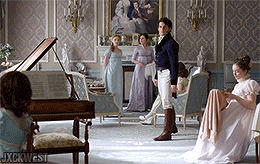
4 notes
·
View notes
Text

Goodness, ISAAC ACKERLEY has arrived in London. He is 33, of the Appalachia Ackerleys. Though they are new to the Season, we can only describe them as industrious and courageous, dear reader. Accompanied by their mother and younger brother, they have settled in and are accepting social calls. But be warned: they are known for their complete lack of knowledge about how England works, not to mention the Season.
This is Isaac, and he’s from America! Well, he was born in England, to a father who was distantly related to the Marquess of Halifax and a Scottish mother who wasn’t related to anyone fancy at all. They decided when Isaac was quite young that England was no longer for them, so they moved over to America, specifically the Appalachian Mountains. Some of his mother’s relatives were already living in the Blue Ridge Mountains, so they settled there in the Smokies part right between North Carolina and what would become Tennessee.
Isaac grew up as a woodsman, living off the land and helping his family run their small farm and fur trading business. He can trap, hunt, fish, whittle, track, set a fire, the works. He especially excels at hunting, which became his trade. He never intended to get married because he spends so much time outdoors, away from everyone.
About eight months ago, he received a letter from England about how one of his relatives, that Marquess of Halifax guy, had passed away and somehow he’s the heir. Uh-huh. He tried to give the burden the honor to his little brother Jeremiah but his mother wouldn’t let him; also it probably wasn’t legal and besides Jeremiah didn’t want it. After a considerable amount of displeasure and discussion about their family, Isaac agreed to at least try it.
He’s a hard-working, goal-oriented kind of person who learned survival tricks at a young age. He was almost eaten by a mountain lion when he was nine. He’s not exactly no-nonsense since he does have a good sense of humor, but he doesn’t get frippery and frills and acting like it’s the end of the world when you get a tea stain on your shirt. At least it’s not blood, right? That’s a lot harder to get out. He’s pretty up front about his feelings and doesn’t care too much who he offends except he’s a gentleman to the ladies. Or tries to be. He’s still figuring that out. He at least ATTEMPTS. Sometimes.
He’s currently in a constant argument with the servants and his mother over wearing his favorite buckskin jacket in public.
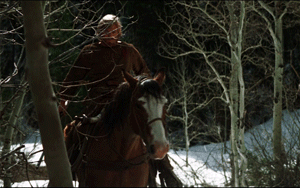
Basically this but Sebastian Stan. Please allow him to cause chaos with your local socialite.
9 notes
·
View notes
Text
“In this debate, parties were blamed for encouraging a form of herd mentality in politics. George Savile, 1st Marquess of Halifax, likened parties to “an Inquisition, where Men are under such a Discipline in carrying on the common Cause, as leaves no Liberty of private Opinion.” More fundamental was the concern that parties exacerbated division and turned neighbors into enemies. As Joseph Addison wrote in the Spectator, “I am sometimes afraid that I discover the seeds of civil war in these our divisions.” What made things worse was that partisanship often seemed random. “There is a sort of Witchcraft in Party, and in Party Cries, strangely wild and irresistible,” wrote Thomas Gordon, co-author of Cato’s Letters. “One Name charms and composes; another Name, not better nor worse, fires and alarms.”
Most astute political commentators, however, realized that parties were not going away. They were a price worth paying for parliamentary politics and ultimately a sacrifice for political freedom. A state without parties was a state without liberty, as Montesquieu put it in his history of the Roman republic. A government without parties is an absolute government, since rulers without opposition are autocrats. Opposition, to be effective in a parliamentary system or in any system with an assembly, must be organized.
(…)
Rapin argued that the two parties in Britain, the Whigs and Tories, represented the two pillars of the mixed and balanced constitution – parliament on the one hand, and monarchy on the other – and that both parties were necessary for the equilibrium between them. They were likewise necessary for balance in the religious sphere, which was as important as secular matters in public life at the time. The Tories favored the Church of England, the Whigs toleration for Protestant Dissenters, and the only way to achieve a sustainable equilibrium between the two extreme positions was competition and mutual checking and balancing between the parties. These parties would alternate in government and take turns to hold each other to account when out of power.
The Scottish Enlightenment thinker David Hume (1711-76), who read Rapin at an early age, wrote at length about party in general and in its British guise in a series of essays published as Essays, Moral and Political in different instalments starting in 1741. Hume believed that parties – or “factions,” terms he used interchangeably – based on “principles” were particularly pernicious and unaccountable. Religious principles had the potential of making people fanatical and ready to both proselytize and persecute dissidents. Because they were more transparent and less extreme, parties based on “interests,” meaning different economic interests, were more tolerable. His early essays on party, “Of Parties in General” and “Of the Parties of Great Britain” (both 1741) treated the phenomenon as inevitable since the British parliamentary system produced to Court and Country parties, or parties of government and opposition.
In later writings, Hume suggested that party politics could be necessary and possibly salutary for political societies. In “Of a Coalition of Parties” (1758), Hume opened by arguing that it may be neither possible nor desirable to abolish parties. This essay was an apologia for his own History of England (1754-61). In this earlier work, Hume had written that “while [the Court and Country parties] oft threaten the total dissolution of the government, [they] are the real causes of its permanent life and vigour.”
(…)
In the pages of the Craftsman, Bolingbroke justified the existence of an oppositional “Country party.” In Bolingbroke’s formulation, it would function as a constitutional party, and he argued that the government of the day (Walpole’s Whigs) had betrayed the core principles of the constitution by corrupting parliament and making the legislature dependent on the executive. In A Dissertation upon Parties (1733-4), Bolingbroke separated the political landscape into three camps: 1) enemies of the government but friends of the constitution, referring to his own Country party; 2) enemies of both, meaning the Jacobites; and 3) friends of the government but enemies of the constitution, that is, the Court Whigs. Only the first category was a legitimate party, whereas the other two were factions, according to Bolingbroke. To save the nation, he argued, the enemies of the constitution had to be opposed, and opposition must be systematic and concerted.
Burke, a Whig later in the century, was not favorable towards Bolingbroke’s Country Tory politics and even less so towards his Deistic and anti-clerical religious writings. Burke continued, however, to distinguish between party and faction in even more forceful terms than Bolingbroke, as he sought to justify his party connection, the Rockingham Whigs, in the 1760s and onwards. To defeat what he viewed as the Court cabal and the abuse of the royal prerogative in the reign of George III, Burke believed that party connection was essential to restore Britain’s mixed and balanced constitution. “When bad men combine, the good must associate,” Burke wrote in Thoughts on the Cause of the Present Discontents (1770), “else they will fall, one by one.” Politics was not about having a clean conscience but about making a difference, and party was a necessary instrument that could unite power and principle. As he famously defined party: “Party is a body of men united, for promoting by their joint endeavours the national interest, upon some particular principle in which they are all agreed.” At the heart of this definition is a distinction between party and faction. Parties for Burke are devoted to promoting an understanding of the national interest, and they are united by principle, and not exclusively by interest, although that can be a supporting principle.
The core of Burke’s party was made up of major Whig aristocratic families such as Cavendish and Devonshire. In the Present Discontents, however, Burke stated that he was “no friend to aristocracy,” in the sense at least in which that word is usually understood, that is to say, as “austere and insolent domination.” What the Whig aristocrats possessed was property, rank, and quality which gave them a degree of independence, and this enabled them to stand up to both the Court and the populace. In this sense, Burke’s conception of party was indeed aristocratic, but it was not aristocracy for its own benefit but for the sake of the whole, and part of his defence of Britain’s mixed and balanced constitution.
The British party debate left an ambivalent legacy among early American political actors and thinkers. The most famous discussion of party and faction in the early American republic is found in James Madison’s Tenth Federalist. In this canonical essay, Madison argued that differences and “mutual animosities” could not be extinguished in free governments. He further agreed with Hume that parties of interest were generally more peaceful and governable than parties united and actuated by passion. His solution to party violence resembled Hume’s argument from “Of a Perfect Commonwealth” (1752): the effects of faction can be better controlled in larger states and federations than in city states. Thanks to the greater size and the scope of the United States, the impact of each faction would be mitigated.
A less philosophical but comparably historically significant party argument surfaced in the 1790s. After Madison and Alexander Hamilton had co-operated as Publius in the Federalist Papers, they became rivals as the early American republic split into two political parties: Republicans and Federalists. Washington’s Neutrality Proclamation in 1793 led to a sharp disagreement between the two on the question of executive power in the constitutional order. In short, Madison associated with his old friend and fellow Virginian Thomas Jefferson, the Secretary of State, to oppose Treasury Secretary Hamilton’s centralizing ambitions. In this political environment, a party argument emerged which had more in common with Bolingbroke, and to an extent Burke, than it did with Hume. This was the idea of partisan opposition. The ideal for Jefferson and other opponents of the Federalists was national unity. However, because of what they perceived as the corruption of Federalists such as Hamilton, an opposition party in the shape of the Republican Party was necessary to defeat the enemies within. Jefferson believed that the Hamiltonians and the Federalists were monarchists, and he viewed the 1790s as an ideological battle between liberty and tyranny. In this struggle, partisanship became a necessary evil.
Many eighteenth-century thinkers contended that constitutional party politics were sometimes necessary to save liberty from authoritarianism and corruption. Indeed, party politics itself was a sign of liberty, since it enabled isolated individuals to participate, and thus gave life and vigor to politics. Such politics could generate “harmonious discord” and be as close an approximation of the common good as the imperfections and diversity of human society permit. But for this to materialize, the political debate must retain a degree of civility. Admittedly, most eighteenth-century partisans fell as short as we moderns in this regard. This is the reason why Hume sought to persuade partisans “not to contend, as if they were fighting pro aris & focis,” literally for altars and hearths, or for God and country.
For Hume, it was also crucial that parties were “constitutional.” According to him, “[t]he only dangerous parties are such as entertain opposite views with regard to the essentials of government,” be it the succession to the throne as in the case of the Jacobites, or “the more considerable privileges belonging to the several members of the constitution,” as with the great parties of the seventeenth century. On such questions there should be no compromise or accommodation since that type of party strife could turn into armed conflict. Eighteenth-century politics retained a civil-war edge on both sides of the Atlantic. Recent events, and indeed the nature of party politics itself, have shown that this is a history and a debate we forget at our peril.”
1 note
·
View note
Quote
A prince who will not undergo the difficulty of understanding must undergo the danger of trusting.
Marquess of Halifax
0 notes
Photo
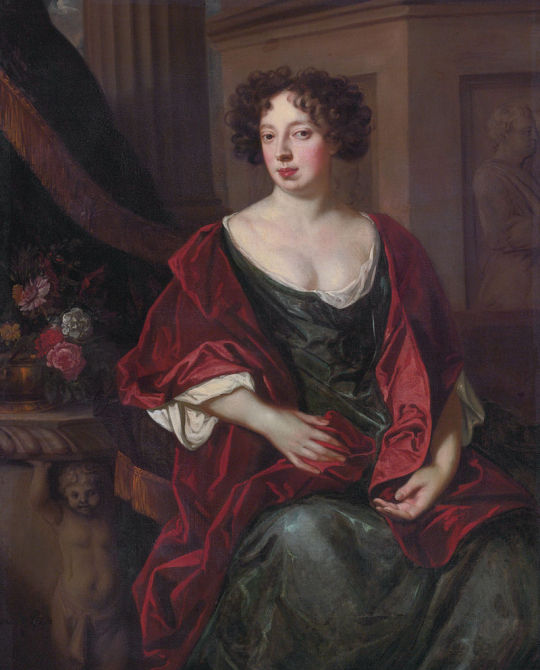
Essex Finch, Countess of Nottingham (c.1652 – 23 March 1684), formerly Lady Essex Rich, was the first wife of Daniel Finch, 2nd Earl of Nottingham.
Essex was the youngest daughter of Robert Rich, 3rd Earl of Warwick, and his second wife Anne Cheeke. She was named after her mother's mother, who was also descended from Robert Rich, 1st Earl of Warwick. Following her mother's death, Essex and her sisters were brought up in the household of her father's brother, Charles Rich, 4th Earl of Warwick.
Husbands proposed for Lady Essex Rich included the son of Baron Berkeley of Stratton and Thomas Vane. However, on 16 June 1674, she married Daniel Finch at Leez Priory, near Felsted, and they moved in with his parents at Kensington Palace. The couple had eight children but only one daughter survived to adulthood: Mary Finch (1677-1718), who married William Savile, 2nd Marquess of Halifax, as his second wife. Halifax died in 1700 and she then married John Ker, 1st Duke of Roxburghe.
The Countess of Nottingham died in childbirth, and was buried in the family vault at Ravenstone. Following her death, her husband remarried, his second wife being the Hon. Anne Hatton, by whom he had several children.
0 notes
Text
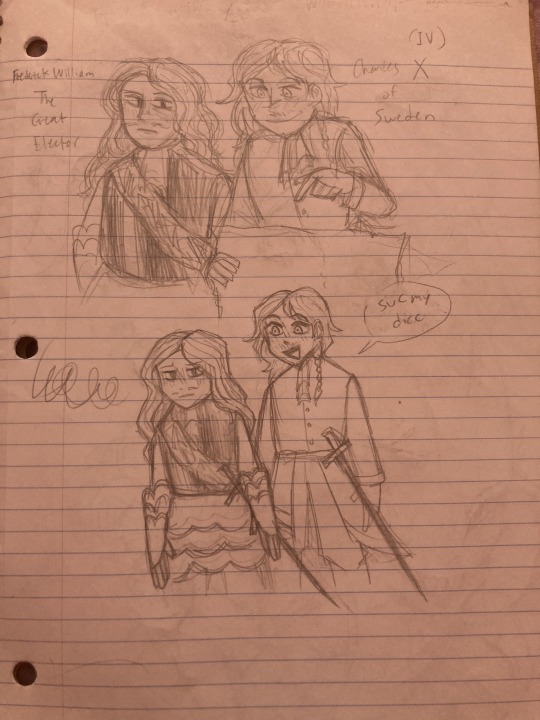

woh its the great elector and an AWFULLY INACCURATE Charles X of Sweden
with a side of yin & yang
#i made this design for karl w/o knowing what he looked like#and i wanna keep it that way#the notebook is SO crusty#i cant tell if i was trying to ship FW and Karl or not#but hey suck my dick goes two ways i guess#danby and halifax were just in the notebook so why not throw em here#old notebook dumps 101#yin and yang ship tag#thinking of one for FW and Karl lmao 😭#duke of leeds#marquess of halifax#frederick william#the great elector#charles x of sweden
5 notes
·
View notes
Note
I recently read That Scandalous Evening by Christina Dodd and I was wondering if you have read books with that kind of dynamic? Like the hero/heroine wanting to paint/draw/sculp the hero/heroine
I love That Scandalous Evening! Art in HR peaked with that book imho; that nude sculpture with only a little fig leaf covering his bits was inspired, but what really put it over the top was the aftermath when Ransom is ENRAGED and HORNY and clearly into Jane's hero worship but he's also being likened to a DOG and he literally presses her hand to his dick and says "note the difference"— all of which I was completely not expecting so that made it even better. Anyway— artist/muse recs:
My Dirty Duke by Joanna Shupe: Violet is a photographer and uses the camera her dad's best friend Ravensthorpe gifted her to photograph him nude (front and back 👏🏼).
Falling Into Bed with a Duke Lorraine Heath: The hero Ashbury likes to photograph legs and when Minerva Dodger propositions him at a sex club, he jumps at the chance to get those leg pics (I also have in my notes him saying "your foot is flawless" and between this and In Want of a Viscount I'm starting to think Lorraine Heath likes to write in a tasteful foot fetish).
In Which Matilda Halifax Learns the Value of Restraint by Alexandra Vasti: Ashford is Matilda's accidental(?) muse in that her erotic cartoons of dirty profs tying gals up were subliminally inspired by Ashford, but then the publisher took some liberties to make it a more exact likeness, namely adding an ass tat, which is why Ashford hunts down Matilda to "make her pay" or something.
The Marquess Method by Kathleen Ayers: I forget if Theo actually ends up painting a miniature of Haven but she definitely wanted to, so she informs him in the middle of having sex, down to the paint shade she'd use. This is the same woman who painted a miniature of herself with one(?) tit out in order to lure a guy she liked... only to get compromised by Haven.
Sweetest Scoundrel by Elizabeth Hoyt: The funny thing about this one is that Asa is all "oh Eve is suuuuuch a shrew" but then the second she asks to paint him but clarifies it's not a nude, he's super butthurt and is like "is it because I'm a COMMON LOUT? too ugly to be painted naked??" and if that doesn't inform their dynamic idk what else will. Also, there's this whole subplot of Bridget Crumb being *enthralled* by Val's tasteful nudes in his house.
Midnight Ruin by Katee Robert: As of today I can confirm Orpheus did a series of paintings of Eurydice's vaj but kept them private, even after they broke up. There is also a body painting/edging sex scene.
Serving Pleasure by Alisha Rai: Rana kinda stalks Micah but he's aware and very into it and eventually asks her to be his muse for his paintings/fuckbuddy for the duration. It's actually SO HOT and Rana's the kind of crazy heroine I wanna see more South Asian girlies written as.
Captives of the Night by Loretta Chase: Leila is an artist and she either does paint Esmonds or wants to paint him.
#book recs#joanna shupe#alisha rai#elizabeth hoyt#katee robert#loretta chase#lorraine heath#alexandra vasti#kathleen ayers#historical romance#contemporary romance#romance novels#ask
3 notes
·
View notes
Note
Any recommendations for Historical’s that are brothers best friend? Or sister even?
Brother's Best Friend:
Goddess of the Hunt by Tessa Dare. The brother asks his best friend to pretend to court the sister, because the sister is "in love" with another friend. Our hero, obviously, ends up realizing he doesn't want her with ANYONE else. Funny and hot.
Ever Yours, Annabelle by Elisa Braden. The heroine is obsessed with her brother's friend when they're kids, but accidentally causes an accident that leaves him with a permanent limp and they separate until they're adults. After which he realizes she's All Grown Up.
A Rake's Guide to Seduction by Caroline Linden. This is the one where the hero realizes his best friend's little sister is someone he's like, kind of in love with and wants to court... just as she gets engaged to another man. However, she becomes a widow and they reunite years later at a house party when he's become this known scandal and she's jaded and depressed. He brings her back to life!
In Which Margo Halifax Earns Her Shocking Reputation by Alexandra Vasti. Hilarious roadtrip romcom in which the hero (a virgin!) has been in love with his best friend's wild, scandalous sister for years, and they end up pursuing her twin (who runs off with another man in another great book) on this wild adventure. And they hook up in the woods at some point, and it's GREAT!
The Duke in Question by Amalie Howard. In this case, the hero is like, a spy, and the heroine ends up getting entangled in his mission. This is the one where they do it against a tree, and after there's this handkerchief she used to clean up, and he picks it up and realizes there's blood on it lol. And he's like "OH MY GOD I DEFLOWERED MY FRIEND'S SISTER I AM TRASH" and she's so blase. Like "yes and?"
The Earl I Ruined by Scarlett Peckham. This chilly earl has long had a thing for his best friend's sister, but that abruptly ends when she ruins his rep by sorta accidentally spreading a rumor that he's like... a submissive man lol. He's actually the TOTAL opposite, and she learns this when getting fake engaged to him to help him recover his rep.
Best friend's brother:
Scoundrel of My Heart by Lorraine Heath. The heroine is close friend's with another lady, and her friend's rakish brother begins helping her gain the attention of this duke who's famously looking for a wife. They start falling, they kiss... and then something massive happens that totally upends his life and separates them. A year later, she meets him again and he's this totally changed, hardened man, and she's engaged to the duke, and the angst is EXQUISITE.
Her Prodigal Passion by Grace Callaway. This one has the heroine who's like, in love with her best friend's rakish wastrel brother, and in the beginning they have a SERIOUS moment (I mean it's Grace, so it's by no means an innocent moment lol) but she realizes after that he was totally out of it due to being like, drunk and high, so he doesn't remember it at all. Then a year or two later, the sparks begin flying and he starts to seriously want her. There's a sexy phrenology scene here, which is so wild? Only Grace.
The Wrong Marquess by Vivienne Lorret. This one has the heroine make friends with this girl, and they become buddies super naturally. But the friend's older brother HATES the heroine, and she HATES him... Until he realizes he's actually obsessed with her. Unfortunately, she's been waiting for her childhood best friend to propose for years (he sucks)... But as the tension begins racking up, she's not as sure about all that lol.
6 notes
·
View notes
Text
Early Afternoon || White’s || Late May 1800
The air was thick, weighed down by cigar smoke and heat. A fire at the tail-end of May was out of place at a club where gentlemen would soon be seeking the refuge of cool air and cooler drinks, but the man sat in the armchair closest to the blaze had always run cold.
He stared into hearth with hooded eyes, unconcerned with the discomfort of others in the room, watching as a colorful bit of parchment blackened at the edges. His younger companion, lean and ginger-haired, stood with an arm braced on the mantle. If sweat prickled at his neck he hid it well. The younger man was more focused on holding the attention of his captive audience.
“Terrible, absolutely terrible. The depravity of man, or woman more like. One would hardly expect such lewd missives from a Lord Whistledown. But idle minds lead to idle hands, you know, and thoughts of ribbons and flounces have never been especially stimulating. The devil’s hands sport lace gloves, apparently.”
The wrinkles around the ice blue eyes in the chair crinkled through a plume of cigar smoke in answer to the joke.
“And the caricature,” the younger man continued, though he hesitated as he saw the elder man’s jaw clenched. “Well, I will only say it is best suited for kindling.” He nodded toward the dwindling copy of the drawing, already turned to ash.
“It seems unfair to me, and I am sure you feel the same, that Lady Fitzroy should come out of this looking so…I hesitate to say undignified, but I struggle for an appropriate word that isn’t more critical than it ought to be.”
The gentleman in the chair tapped the end of his cigar into the ash tray set on the side table to his left. Whether he concurred would be determined by where this thought ended.
“Meanwhile this other— here again I struggle for a word, though this time the one chosen feels too generous —this other ‘gentleman’ is hardly censured. Why, I thought I heard a gaggle of silly chits tittering that they hoped he would grab for their stockings. Of course, I may have misheard, however—”
Lord Fletcher stopped abruptly, straightening from his slouch against the fireplace. “Why, let us go straight to the source. Lord Halifax!” He called to the Marquess, who had only just appeared. “How fortuitous. We were just discussing you.” The curve of his lips curled into a self-satisfied smile as he turned man in the armchair. “May I take the liberty of introducing you to the Duke of Buccleuch, Lord Fitzroy.”

@jeremiahtheyankee
16 notes
·
View notes
Text
May, 1799
Buckingham House
At or around a time where there would be tea
Charlotte despised cinnamon, and the rancor was evident on her face as soon as the cup was poured. Doleful, her gaze lifted to the servant, who hesitantly mentioned something about her humors being out of sorts, and it on the advice of the palace physician, and if she would just try--
One long, slow sip. Tried. Done. A hand lifted, she summoned more snuff, as a servant appeared, bringing what she could only describe as a... large amount of furs strapped to a man... into her receiving rooms.
“May I present, the Marquess of Halifax.”
Charlotte blinked. “Are you sure?”
@mountainmarquess
0 notes
Text
Bennetton Regatta | Day 2, Late Morning | Clementine Boat
Short Answers Game!
“Uh,” said Jeremiah, waving his hand to get the attention of the rest of the boat. “I thought we might play a--a game?”
Today the Marquess of Halifax didn’t look nearly so sullen and exhausted as he did after jumping overboard for Lady Fitzroy the day prior. His hair was combed and in order, and he sported a deep green jacket and silver waist coat (and the jacket seemed to settle strangely when he moved, at times, due to the rocks he’d found and put in the pockets for later).
“It’s called, uhm, Short Answers. I used to play with my brother, have you, uh, all heard of it? I’ll simply pose a question to one of you and your answer can only be one word--er, one syllable. If--if the answer is more than one syllable, then there’s a forfeit for each extra syllable. Uhm. My brother and I used to punch each other as forfeit, but maybe not... that. The forfeit could be a, uhh, kiss,” he added quickly, not sure why he landed on that. “On the--hand, or, uh, face, or--yeah!”
“I’ll start us, uh, off. Would you rather eat an apple or drink apple cider?” he asked the person to his left.
---
Short Answers time! Here’s how it works: one character will ask another character a question. The answer must be given as a single syllable word. If more than one syllable is used, the player must make a forfeit for each extra syllable. For this game, the forfeits are kisses.
Repeated questions will cause a forfeit as well, so pay attention!
Ex:
Jeremiah asks Harry: Dogs or cats?
Harry: Dogs.
Harry then asks the next question to a new player.
Harry asks Diana: Birds or fish?
Diana: Canaries!
Diana’s answer contained three syllables and so she must make two forfeits because she had two extra syllables. Two kisses for Harry! And Diana moves on by asking a new player a new question.
So on and so forth. The questions can be as simple or complicated as you want. Have fun!
@dianabartlett @earlharcourt @eliza-bates @lordkerr @harry-cadogan @domesticrage @lcdyofcobham
3 notes
·
View notes